
Vittorio De Sica was an Italian film director and actor, a leading figure in the neorealist movement.

Italian neorealism, also known as the Golden Age, was a national film movement characterized by stories set amongst the poor and the working class. They are filmed on location, frequently with non-professional actors. They primarily address the difficult economic and moral conditions of post-World War II Italy, representing changes in the Italian psyche and conditions of everyday life, including poverty, oppression, injustice and desperation.
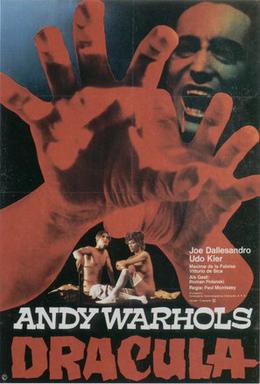
Blood for Dracula is a 1974 horror film written and directed by Paul Morrissey and starring Udo Kier, Joe Dallesandro, Maxime McKendry, Stefania Casini, Arno Juerging, and Vittorio de Sica. Upon its initial 1974 release in West Germany and the United States, Blood for Dracula was released as Andy Warhol's Dracula.

Renato Salvatori was an Italian actor.

Telefoni Bianchi films, also called deco films, were made by the Italian film industry in the 1930s and the 1940s in imitation of American comedies of the time in a sharp contrast to the other important style of the era, calligrafismo, which was highly artistic. The cinema of Telefoni Bianchi was born from the success of the Italian film comedy of the early 1930s; it was a lighter version, cleansed of any intellectualism or veiled social criticism.

Mario Camerini was an Italian film director and screenwriter.

The Sign of Venus is a 1955 Italian comedy film directed by Dino Risi and starring Sophia Loren. It was entered into the 1955 Cannes Film Festival.

Sardinian Vendetta is a 1952 Italian comedy film directed by Mario Mattoli and starring Walter Chiari, Carlo Croccolo and Giovanna Pala. It as shot at the Icet Studios in Milan and the Ponti-De Laurentiis Studios in Rome. The film's sets were designed by the art director Alberto Boccianti.
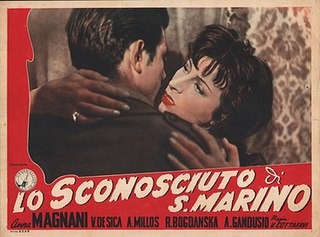
The Unknown Man of San Marino is a 1946 Italian drama film directed by Michał Waszyński and starring Anna Magnani, Vittorio De Sica and Antonio Gandusio.
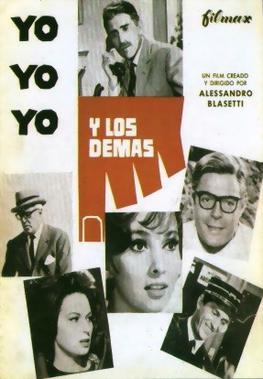
Me, Me, Me... and the Others is a 1966 Italian comedy film directed by Alessandro Blasetti. For this film Blasetti won the David di Donatello for best director.
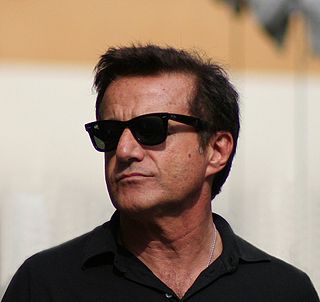
Christian De Sica is an Italian actor and film director.
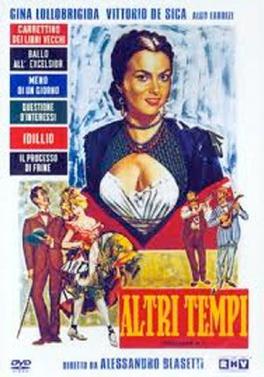
In Olden Days is a 1952 Italian comedy drama anthology film directed by Alessandro Blasetti and featuring an ensemble cast that included Gina Lollobrigida, Amedeo Nazzari, Vittorio De Sica, Elisa Cegani, Barbara Florian, Aldo Fabrizi, Andrea Checchi and Alba Arnova. It was shot at the Cinecittà Studios in Rome. The film's sets were designed by the art directors Dario Cecchi and Veniero Colasanti. It is also known as Times Gone By and Infidelity.

Myriam Bru is a French retired actress and the wife of German actor Horst Buchholz, to whom she was married from 1958 until his death in 2003. She appeared in 16 films between 1952 and her marriage in 1958, when she retired from acting to raise her two children, one of whom is German actor Christopher Buchholz.

Carlo Montuori was an Italian cinematographer and cameraman.

Lia Franca was an Italian film actress. She was sometimes credited as Lya Franca and Libia Franca.
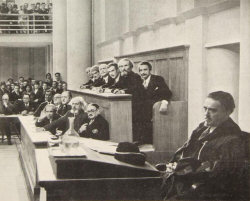
Before the Jury is a 1931 Italian crime film directed by Guido Brignone and starring Marcella Albani, Lia Franca and Carlo Ninchi. It was made at the Cines Studios in Rome. The film is a precursor to the later genre of Giallo films.
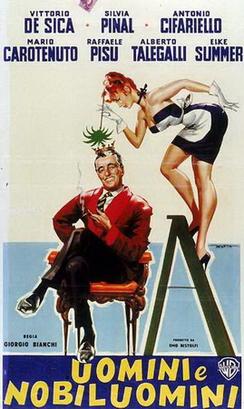
Men and Noblemen is a 1959 Italian comedy film directed by Giorgio Bianchi and starring Vittorio De Sica.
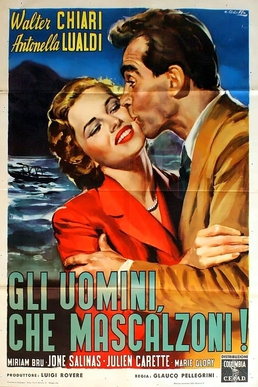
What Scoundrels Men Are! is a 1953 Italian comedy film directed by Glauco Pellegrini and starring Walter Chiari, Antonella Lualdi and Myriam Bru. It is a remake of the 1932 film of the same title starring Vittorio De Sica.
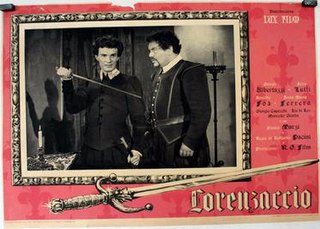
Lorenzaccio is a 1951 Italian historical drama film directed by Raffaello Pacini and starring Giorgio Albertazzi, Folco Lulli and Anna Maria Ferrero. It is an adaptation of the 1834 play Lorenzaccio by Alfred de Musset about the life of Lorenzino de' Medici.

But It's Nothing Serious is a 1936 Italian "white-telephones" romantic comedy film directed by Mario Camerini and starring Vittorio De Sica, Elisa Cegani and Assia Noris. It is based on a play by Luigi Pirandello. Two years later Camerini remade it as a German film The Man Who Couldn't Say No.
This page is based on this
Wikipedia article Text is available under the
CC BY-SA 4.0 license; additional terms may apply.
Images, videos and audio are available under their respective licenses.



















